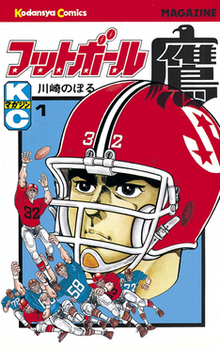| Football Hawk | |
 First
tankōbon volume cover | |
| フットボール鷹 (Futtobōru Taka) | |
|---|---|
| Genre | Sports [1] |
| Manga | |
| Written by | Noboru Kawasaki |
| Published by | Kodansha |
| Magazine | Weekly Shōnen Magazine |
| Demographic | Shōnen |
| Original run | January 9, 1977 – April 1, 1979 |
| Volumes | 10 |
Football Hawk ( Japanese: フットボール鷹, Hepburn: Futtobōru Taka) is a Japanese manga series written and illustrated by Noboru Kawasaki. It was serialized in Kodansha's Weekly Shōnen Magazine from January 1977 to April 1979 and published in ten volumes.
Media
Manga
Written and illustrated by Noboru Kawasaki, the series began serialization in serialization in Kodansha's manga magazine Weekly Shōnen Magazine on January 9, 1977. [2] It completed its serialization on April 1, 1979. [3] Its individual chapters were collected into ten tankōbon volumes. [4]
Volumes
| No. | Japanese release date | Japanese ISBN |
|---|---|---|
| 1 | July 26, 1978 [5] | 978-4-06-109483-3 |
| 2 | July 26, 1978 [6] | 978-4-06-109484-0 |
| 3 | August 18, 1978 [7] | 978-4-06-172516-4 |
| 4 | September 21, 1978 [8] | 978-4-06-172520-1 |
| 5 | October 20, 1978 [9] | 978-4-06-172526-3 |
| 6 | December 19, 1978 [10] | 978-4-06-172551-5 |
| 7 | January 23, 1979 [11] | 978-4-06-172560-7 |
| 8 | February 22, 1979 [12] | 978-4-06-172566-9 |
| 9 | March 23, 1979 [13] | 978-4-06-172571-3 |
| 10 | April 20, 1979 [4] | 978-4-06-172578-2 |
Audio drama
An audio drama adaptation, with scripts written by Mamoru Sasaki and starring Kinya Aikawa, was released by NHK FM Broadcast. It ran for six episodes from August 14–19, 1977. [14]
Reception
In 1978, the series won the 2nd Kodansha Manga Award in the shōnen manga category. [15]
Mike Toole of Anime News Network felt that the story was not as melodramatic as Ikki Kajiwara's Ashita e Free Kick, but that it was well researched and had good artwork. He concluded that "Football Hawk would be the most successful stab at [American football]'s depiction in manga for quite some time". [1]
References
- ^ a b Toole, Mike (February 4, 2019). "The Mike Toole Show Anime in the End Zone". Anime News Network. Archived from the original on January 12, 2024. Retrieved January 11, 2023.
- ^ 週刊少年マガジン 1977年 表示号数2. Media Arts Database (in Japanese). Agency for Cultural Affairs. Archived from the original on January 12, 2024. Retrieved January 11, 2024.
- ^ 週刊少年マガジン 1979年 表示号数14. Media Arts Database (in Japanese). Agency for Cultural Affairs. Archived from the original on January 12, 2024. Retrieved January 11, 2024.
- ^ a b フットボール鷹(10) (in Japanese). Kodansha. Archived from the original on January 12, 2024. Retrieved January 11, 2024.
- ^ フットボール鷹(1) (in Japanese). Kodansha. Archived from the original on January 12, 2024. Retrieved January 11, 2024.
- ^ フットボール鷹(2) (in Japanese). Kodansha. Archived from the original on January 12, 2024. Retrieved January 11, 2024.
- ^ フットボール鷹(3) (in Japanese). Kodansha. Archived from the original on January 12, 2024. Retrieved January 11, 2024.
- ^ フットボール鷹(4) (in Japanese). Kodansha. Archived from the original on January 12, 2024. Retrieved January 11, 2024.
- ^ フットボール鷹(5) (in Japanese). Kodansha. Archived from the original on January 12, 2024. Retrieved January 11, 2024.
- ^ フットボール鷹(6) (in Japanese). Kodansha. Archived from the original on January 12, 2024. Retrieved January 11, 2024.
- ^ フットボール鷹(7) (in Japanese). Kodansha. Archived from the original on January 12, 2024. Retrieved January 11, 2024.
- ^ フットボール鷹(8) (in Japanese). Kodansha. Archived from the original on January 12, 2024. Retrieved January 11, 2024.
- ^ フットボール鷹(9) (in Japanese). Kodansha. Archived from the original on January 12, 2024. Retrieved January 11, 2024.
- ^ フットボール鷹. The Script Database (in Japanese). Agency for Cultural Affairs. Archived from the original on January 12, 2024. Retrieved January 11, 2024.
- ^ フットボール鷹. Mangapedia (in Japanese). Archived from the original on January 12, 2024. Retrieved January 11, 2024.